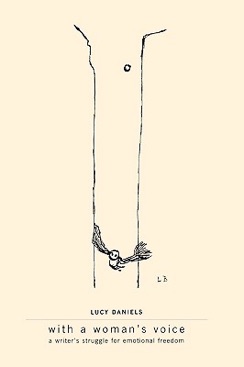An excerpt from
With A Woman’s Voice: A Writer’s Struggle for Emotional Freedom
In my dining room there is a beautiful bowl of purple glass. I bought it in Venice the first time I went there with Rudy, my second husband. Because of how perfectly it symbolizes Italy, that bowl made me love it at first sight. Its thick glass is amethyst in color but frosted on the outside with a thin, splotchy white-gray crusting that makes it look rugged and weathered like a mountain misted with ash. Near the middle of its sloping sides a crude river of darker purple suggests molten lava or deep cool water varying wildly in breadth. Beckoning one, as it seems, to richness buried or swirling through space, that river refutes fragility.
In sunlight these blended purples evoke a multitude of reflections: of beautiful old Italy with its mists, mountains, and chapel-studded countryside; of how deeply in love I was at the time, and of the man who has since shattered and vanished from my life. I still remember leaving St. Domenico with him early that August morning to catch our flight home from Milan. Looking up at the mountain lit by a single star in the fading night sky, we found its peak already white with the first snow. I felt terribly sad that dawn because our trip was nearly finished and I feared the relationship might be, too. Recently I’ve been sadder still.
But beyond that memory, this bowl embodies feelings that I was once denied but have come to recognize as the very essence of my being: conflict, choice, and struggling between the two; the strain to discern clarity from confusion and to bear the inextricableness of beauty and brutality, strength and delicacy, sweetness and sadness.
Today when I focus on these feelings, in my habit of striving for self-understanding, I never know what will happen. Sometimes there is nostalgia for the sweetness of feeling loved best of all by Father. Or Rudy. Sometimes there’s aching sadness from knowing the impossibility of such wishes. Surprising images and, occasionally, brainstorms, can come to mind; whereas once I didn’t dare to be so open. Because then I was afraid to see—the truth, perhaps, or some forgotten pain. But growing older has weathered me in a way that’s no longer burdened by apprehension. It allows me to look and look and to occasionally have the delicious experience of seeing for the first time something remarkable that’s always been there. I do this with everything now—dreams, music, patients, works of art, and friends, as well as self. I call this being alive.
